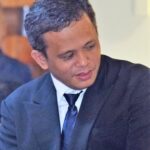
Christopher Maboloc
In the last Social Weather Stations (SWS) Survey, 48% of Filipinos rated themselves as poor. That is equivalent to 13 million households. Meanwhile, the actual poverty incidence in the Philippines stood at 18.1%, according to the Asian Development Bank. Why is it that more people think that they are poor? What is the explanation for this? First off, it can be said that it is about their fear of what the future might hold. These aren’t just numbers. The survey reflects the socio-economic conditions of people that can severely impact their living conditions.
In fact, people think that they are poor because they cannot afford the rising price of basic commodities, noticeably rice and fuel. Inflation puts pressure not only on poor people but the government as well. These problems are interrelated. If the prices of goods are high, workers will demand more pay from their employers. The government, meanwhile, needs to balance things as the increase in wages has a big effect on inflation. Companies will simply pass on to consumers future wage measures that the government may impose.
Two things – there is a short-term approach to addressing poverty, and the long-term policy-driven strategies to change the lives people have. Conditional cash transfers allow poor families to send children to basic education, have regular visits to health centers, and even participate in community-based programs. The long-term approach has something to do with job creation and improving the pay of workers. This means the government must have sustainable economic policies and sound political decisions. Foreign investments are needed to generate more jobs and revenues for the government in order to pay for development programs.
Corruption needs to be solved, if not, reduced. The problem has become systemic. A corrupt political culture will impact the standard of living of people. The relationship between poverty, corruption, and a weak democracy is apparent. Corrupt politicians manipulate the poor. The poor sell their votes because they do not believe that elections matter in terms of the desire to live a better life. This is made much more difficult by educated people who also do not believe in elections. In both instances, it is the unscrupulous politician who takes advantage and benefits in the process.
“A country is only as good as the kind of education it provides to its people.” This is the mantra of the United Nations Development Program. According to Mahar Mangahas, the available data say that for every ten Filipino adults today (18 years old and above), only one has finished college, two are Senior High School graduates or its equivalent, three have finished Junior High School, a further three graduated from elementary school but did not finish Junior High, and one finished elementary education. Human poverty and education are correlated. The higher a person’s qualifications are, the more opportunities are available to him or her.
People who live in urban centers do not feel as poor as those who are in rural areas. The reason for this is the accessibility of basic services in cities compared to far-flung villages. Although there is a feeling of discomfort due to a worsening traffic situation and other things related to urban living, it is far more difficult if hospitals and schools are faraway, or when roads are decrepit and water resources are non-existent. The lack of electricity also impacts the education of children. Young people have deep aspirations in life, but they need all the support to realize their dreams and ambitions.
Precisely, overpopulation becomes a problem because of scarce resources. Amartya Sen is right when it comes to the idea that development is “the expansion of the freedoms that people enjoy.” Mahbub Ul Haq says, “people are the real wealth of a nation.” The real purpose of development, he argues, is to create an “an enabling environment where people can enjoy long, healthy and creative lives.” This pronouncement needs to be nuanced, however. In developing countries (formerly known as Third World), there are actually obstacles to growth and progress. This includes the lack of political freedoms, bad infrastructure, corruption and weak political systems, and the overall geopolitical order that naturally favors wealthy and powerful nations. (Ryan Maboloc)


